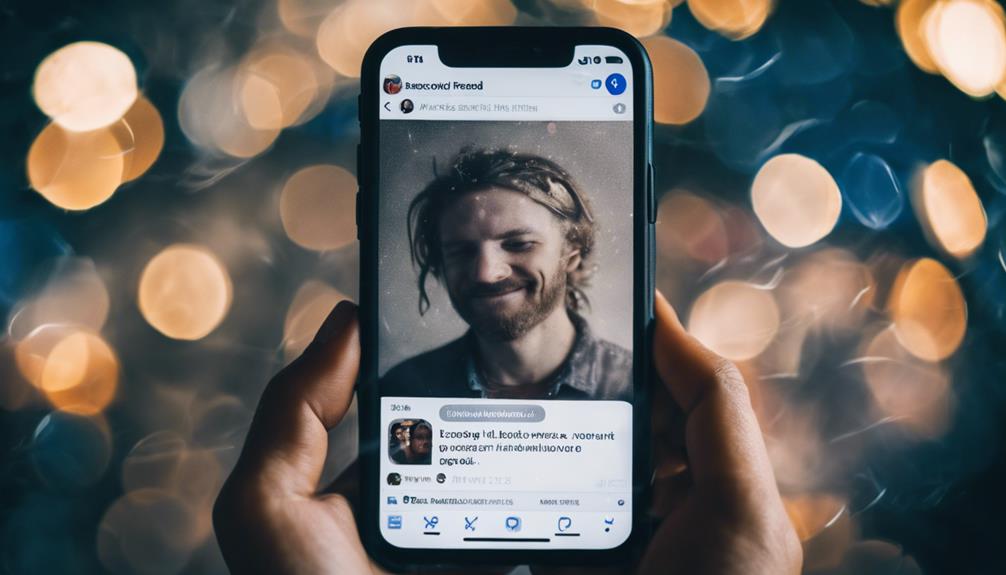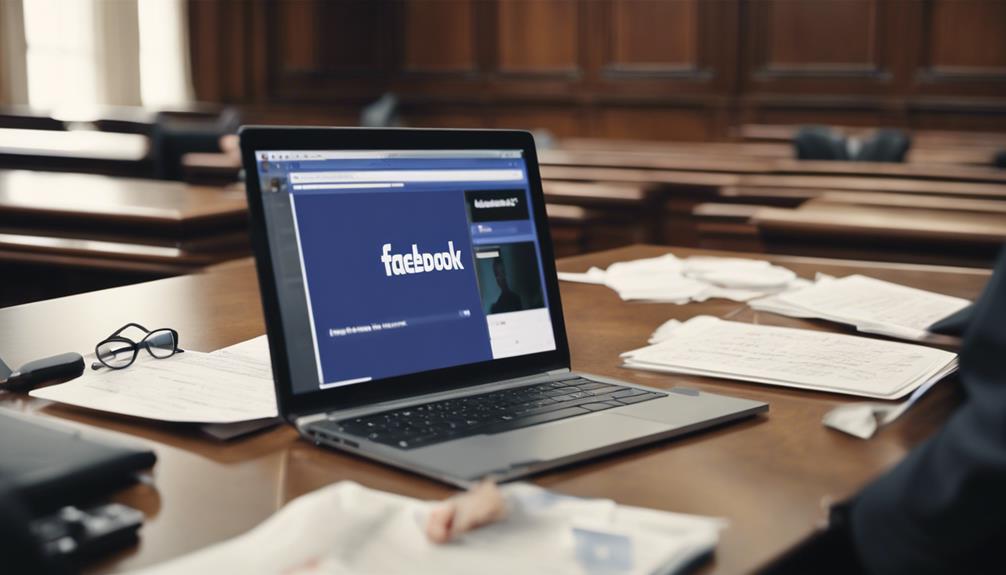Relationships
Is Facebook Tearing Marriages Apart
Ominous digital footprints on Facebook may be silently destroying marriages, but what's behind this disturbing trend?

Facebook's role in modern divorce cases has become increasingly significant, with lawyers citing social media evidence, mainly from Facebook, as a key contributor to the breakdown of marriages. Inappropriate conversations, physical relationships, and public displays of infidelity on Facebook have become common, often leading to legal scrutiny. Lack of privacy settings and intentional or unintentional digital trails can reveal marital deception, making Facebook a hub for exposing infidelity. As online connections lead to emotional betrayal and cybersex can damage real-life relationships, Facebook's impact on marriages is a complex issue that warrants further exploration.
Key Takeaways
• Facebook is a primary platform for exposing marital deception, with public displays of infidelity and inappropriate relationships.
• Lack of privacy settings can lead to legal scrutiny, making users vulnerable to evidence collection in divorce cases.
• Online evidence, including Facebook content, is increasingly used in legal battles to establish patterns of behavior and prove fault in divorce cases.
• Social media platforms can facilitate infidelity, secrecy, and deception, leading to destructive forces in marriages and emotional betrayal.
• Online infidelity can have consequences as painful as physical cheating, eroding trust and creating distance in relationships.
Facebook's Role in Divorce Cases
Four out of five lawyers report a significant increase in social media evidence, primarily from Facebook, in divorce cases. Common offenses include inappropriate conversations and physical relationships. This surge in social media evidence has led lawyers to scrutinize Facebook profiles of potential clients, seeking signs of misconduct.
In fault-based divorce states, spouses may face financial penalties if found guilty of infidelity. Facebook's role in divorce cases extends beyond marital disputes, as its content can be used in custody battles and criminal cases. Lack of privacy settings can make users vulnerable to legal scrutiny, and judicial subpoenas can compel Facebook to disclose account contents.
Exposing Infidelity on Social Media

Facebook's facilitation of marital infidelity is often played out in the open, with spouses brazenly conducting illicit relationships and even publicly showcasing their infidelity on the platform. Social media's open nature allows for public displays of affection, flirtation, and even explicit content, making it easier for cheating spouses to get caught.
In some cases, spouses may intentionally leave a digital trail, hoping to get caught or seeking attention. Others may unintentionally reveal their infidelity through tagged photos, public comments, or careless posting. Whatever the motive, social media has become a hub for exposing infidelity, with Facebook being the primary platform for marital deception.
Virtual Relationships and Betrayal

Virtual relationships can masquerade as harmless online connections, but they often conceal a deeper sense of emotional betrayal that can be just as devastating as physical infidelity. These online interactions can create a false sense of intimacy, leading individuals to engage in emotional affairs that can be just as damaging as physical ones.
| Type of Betrayal | Description | Consequences |
|---|---|---|
| Emotional Infidelity | Sharing intimate thoughts and feelings with someone outside the relationship | Erodes trust and creates emotional distance |
| Virtual Affairs | Engaging in romantic or sexual conversations online | Can lead to physical infidelity and divorce |
| Cybersex | Engaging in online sexual activities | Can lead to addiction and damage to real-life relationships |
| Online Flirting | Exchanging flirtatious messages or comments online | Can lead to emotional attachment and betrayal |
Online Evidence in Legal Battles

Lawyers are increasingly relying on online evidence, including Facebook content, to build cases in divorce and custody battles. This trend is becoming more prevalent as social media continues to play a significant role in modern relationships. In many cases, online evidence serves as a smoking gun, providing concrete proof of infidelity or other wrongdoing.
- Online evidence can be used to establish a pattern of behavior, such as inappropriate conversations or relationships.
- Facebook content can be subpoenaed, allowing lawyers to access private messages and other previously hidden information.
- In some cases, online evidence has been used to prove fault in divorce cases, leading to significant financial consequences for the guilty party.
The Dark Side of Social Networking

Behind the facade of social networking lies a sinister reality, where online connections can quickly turn into destructive forces that tear marriages apart. Social media platforms like Facebook, which are meant to bring people together, often facilitate infidelity, secrecy, and deception.
Secret social media accounts enable illicit relationships, and cybersex and virtual interactions can lead to divorce. The lack of privacy settings makes users vulnerable to legal scrutiny, and judicial subpoenas can compel Facebook to disclose account contents. The consequences of online infidelity can be as painful as physical cheating, posing significant challenges to real-life intimacy.
As Facebook facilitates marital infidelity and publicizes it, the dark side of social networking becomes increasingly apparent.
Frequently Asked Questions
Can Social Media Addiction Be Considered a Mental Health Disorder?
Social media addiction sparks debate about its classification as a mental health disorder.
Experts argue that excessive social media use can lead to symptoms similar to substance use disorders, such as withdrawal, tolerance, and neglect of other activities.
While it's not officially recognized as a disorder in the Diagnostic and Statistical Manual of Mental Disorders, some researchers propose including it in future editions.
Are There Online Resources for Couples to Rebuild Trust After Infidelity?
Couples seeking to rebuild trust after infidelity can find online resources offering guidance and support. Websites and forums provide a safe space for open discussions, allowing partners to confront and overcome their issues.
Online therapists and counselors offer professional advice, while support groups connect individuals who've experienced similar situations. These resources help couples navigate the healing process, promoting transparency, accountability, and communication to restore trust and strengthen relationships.
How Can I Protect My Privacy on Facebook From Legal Scrutiny?
As she navigates the digital landscape, she must be cautious of Facebook's double-edged sword. To protect her privacy from legal scrutiny, she should adjust her privacy settings to restrict public access and limit friend requests.
She should also be mindful of tagging and public comments, as these can expose her to third parties. Additionally, she should avoid using Facebook to facilitate illicit relationships or engage in inappropriate conversations, as these can be used as evidence in divorce cases or other legal proceedings.
Is It Possible to Delete Incriminating Content From Facebook Permanently?
She wonders if it's possible to delete incriminating content from Facebook permanently. The answer is no, not entirely.
Although users can delete posts, comments, or messages, they may still be accessible through legal means. Judicial subpoenas can compel Facebook to disclose account contents, and cached or archived versions of deleted content might still exist.
Additionally, screenshots or cached pages can be used as evidence, making it difficult to completely erase incriminating content.
Can Couples Therapy Sessions Be Conducted Online Effectively?
Couples therapy sessions can be conducted online effectively, as long as both partners are comfortable with the digital format. Online therapy allows for increased accessibility and flexibility, especially for those with busy schedules or limited mobility.
However, it's crucial for therapists to establish clear boundaries and guidelines for online sessions to maintain a productive and confidential environment.
Conclusion
As the virtual world increasingly intersects with reality, Facebook's role in marital discord can't be ignored. A staggering 80% of divorce cases now involve social media evidence, with Facebook being the primary source.
This statistic serves as a stark reminder of the platform's significant implications, blurring the lines between virtual and real-life relationships. As the evidence mounts, it's clear that Facebook's impact on marriages is undeniable, raising important questions about the responsibility of social media platforms in preserving the sanctity of relationships.
Relationships
Soulmate Splitsville: When Destiny Romances End
Only by embracing heartbreak can one discover the path to healing and self-discovery after a soulmate split – find solace in resilience.

When destiny romances end, it's important to face heartbreak with resilience and self-discovery. Understand that forever isn't a guarantee in relationships and that it's okay to feel lost. Factors like communication breakdown or personal growth differences may contribute to endings. Coping involves managing intense emotions, seeking support, and practicing self-care. Reflect on lessons learned, build a strong support system, and embrace new connections. Acknowledge personal growth, rediscover interests, and prioritize self-love. Focus on mindfulness and healing wounds, knowing there are opportunities for growth and renewal. Hope and resilience pave the way for a journey of self-discovery and emotional healing.
Key Takeaways
- Acknowledge impermanence and growth differences in destiny romances.
- Embrace closure and new beginnings post-breakup.
- Seek support for managing heartbreak and emotional pain.
- Reflect on lessons learned and practice self-compassion.
- Focus on personal growth, self-worth, and resilience.
The Illusion of Forever
Exploring the concept of forever being an illusion in the realm of destiny romances, it's crucial to consider that when we think about true love, it's easy to get caught up in the idea of a soulmate who'll be with us for eternity.
However, the reality is that relationships, even those believed to be destined, can sometimes come to an end. This challenges our belief in eternal love and soulmate connections. It's important to remember that while the concept of forever is romantic, it can also set unrealistic expectations in relationships.
When soulmates split up, it highlights the impermanence of relationships, despite our initial beliefs in forever. This disillusionment can evoke feelings of loss, betrayal, and questioning of fate.
Unraveling Connections

Amidst the intricacies of destiny romances, unraveling connections in soulmate relationships often involves maneuvering through challenges, conflicts, or shifts in circumstances. When it comes to end relationships, going through this process can be emotionally taxing but can also pave the way for personal growth and new beginnings.
Here are some key insights to take into account:
- Communication Breakdown: Misunderstandings and lack of effective communication can strain the connection between soulmates, leading to potential rifts.
- Personal Growth Differences: Individuals in a relationship may evolve at different paces, causing disparities in values, goals, or priorities that can contribute to the unraveling of the bond.
- External Influences: External factors such as work stress, family dynamics, or unforeseen changes can impact the stability of a soulmate relationship.
- Conflict Resolution: Incompatibilities in handling conflicts or differences in conflict resolution styles can strain the connection over time.
- Acceptance and Closure: Acknowledging the end of a destiny romance and seeking closure is essential for emotional healing and moving forward positively.
Navigating Heartbreak

Unraveling connections in soulmate relationships can lead to managing heartbreak, a process that involves processing intense emotional pain and seeking ways to move forward positively.
Heartbreak from a soulmate split can be overwhelming, stirring up deep feelings of sorrow and emptiness. It's essential to give yourself the time and space to grieve the loss of the relationship. Accepting that the connection has ended is a vital step in the healing process.
Coping with heartbreak involves acknowledging your emotions, seeking support from friends and family, and engaging in self-care practices that nurture your well-being. Therapy can also be beneficial in handling the pain and finding ways to cope effectively.
Reflecting on the relationship can help you understand what lessons you can take away from the experience and how you can grow from it.
Healing Wounds

Healing wounds post soulmate breakup involves actively processing emotions, seeking support, and prioritizing self-care practices. When living together with a soulmate ends, the pain can be intense and overwhelming. To begin the healing process, consider these essential steps:
- Engage in therapy: Talking to a professional can provide valuable insights and tools to navigate the complex emotions that arise after a breakup.
- Reflect on lessons learned: Take time to ponder the experiences shared and the growth that occurred during the time spent living together. This reflection can aid in understanding and acceptance.
- Build a strong support system: Surround yourself with friends and family who can offer comfort, understanding, and a listening ear during this challenging period.
- Practice mindfulness: Engaging in mindfulness techniques can help in staying present and processing emotions in a healthy way.
- Show self-compassion: Be kind to yourself, practice forgiveness, and prioritize self-care activities that promote healing and well-being.
Lessons in Letting Go

Letting go of the notion of soulmates can lead to healthier and more fulfilling relationships. It's not easy to release the idea that one person is meant for us above all others, but sometimes it's necessary for our personal growth.
Recognizing that a relationship believed to be destined has come to an end can be a tough pill to swallow, but it can also bring closure and pave the way for new beginnings. By letting go of the notion that all relationships must last forever, we free ourselves from unrealistic expectations and open our hearts to new connections and experiences.
Learning to detach from the concept of soulmates allows us to embrace the unpredictability of love. Relationships may not always follow a predetermined path, and that's okay. Understanding this can lead to a more authentic and fulfilling love life.
Embracing New Beginnings

Shifting from a soulmate split involves embracing the opportunity for fresh starts and new connections. Embracing the change for fresh beginnings is crucial. Here are some ways to navigate this shift:
- Focus on personal growth: Take this time to invest in yourself, explore new hobbies, or learn new skills.
- Reflect on lessons learned: Ponder what the relationship taught you and how you can grow from those experiences.
- Explore new opportunities: Be open to meeting new people and trying new things to expand your horizons.
- Seek support: Reach out to friends, family, or a therapist for guidance and emotional support during this time.
- Embrace change: Remember that change can lead to growth and new opportunities, so stay open to what the future holds.
Finding Self-Love

Cultivating self-love post soulmate breakup involves a journey of rediscovery and empowerment. After parting ways with a soulmate, it's important to focus on personal growth and healing. Rediscovering your worth and value independently from the relationship is key in this process. Self-love can be nurtured through various practices such as self-care routines, therapy sessions, and moments of self-reflection.
Embracing your individuality and pursuing your passions can greatly aid in your journey towards self-love. Learning to prioritize self-care and establishing healthy boundaries is essential during this period of finding self-love post soulmate breakup. Remember, self-love is about acknowledging your own worth and treating yourself with kindness and respect.
It's okay to take time for yourself, to focus on your needs and desires, and to set boundaries that protect your well-being. By embracing self-love, you're empowering yourself to grow, heal, and thrive beyond the confines of past relationships.
Reclaiming Independence

When facing the aftermath of a soulmate breakup, it's crucial to embrace personal growth, find inner strength, and rediscover self-worth.
Taking time to focus on nurturing ourselves, setting boundaries, and pursuing our passions can be empowering steps toward reclaiming independence.
Embracing Personal Growth
Our journey towards embracing personal growth and reclaiming independence begins with a conscious decision to prioritize self-discovery and self-improvement. It's essential to see the breakup as an opportunity for personal development and growth. Here are some key steps to help navigate this journey:
- Reflect on the breakup: Take time to understand what went wrong and how you can learn from the experience.
- Explore new interests: Engage in activities that bring you joy and help you discover new aspects of yourself.
- Set personal goals: Establish goals that align with your values and aspirations, guiding you towards a brighter future.
- Seek support: Surround yourself with friends and loved ones who can offer encouragement and understanding during this time.
- Celebrate your progress: Acknowledge and celebrate the strides you make towards personal growth, no matter how small they may seem.
Finding Inner Strength
Reflecting on our personal growth journey, reclaiming independence post-breakup involves finding inner strength through rediscovering personal interests and setting boundaries for self-growth.
After the end of a relationship, it's normal to feel lost and unsure of how to move forward. This is where rediscovering personal passions and setting boundaries for self-care come into play. By focusing on what brings us joy and fulfillment, we can begin to rebuild our sense of self and independence.
Building a support system of friends and family is essential during this time. Surrounding ourselves with loved ones who uplift and encourage us can provide the emotional stability needed to navigate the aftermath of a breakup.
Setting boundaries is equally important in reclaiming independence. Learning to prioritize our own well-being and growth by saying no to things that no longer serve us is a powerful step towards regaining our sense of self.
Engaging in new hobbies or activities can also boost our self-confidence and help us move forward. Exploring new interests not only distracts us from the pain of the past relationship but also allows us to rediscover parts of ourselves that may have been neglected.
Rediscovering Self-Worth
Rediscovering self-worth post-breakup involves embracing personal strengths and values to foster empowerment and confidence. As we navigate this journey of reclaiming independence, it's vital to focus on self-care, self-love, and personal growth.
Research shows that embracing independence can lead to a newfound sense of confidence and empowerment. To aid in this process, setting boundaries and learning to prioritize ourselves are pivotal steps. Additionally, taking time to heal, reflect, and engage in activities that bring joy can support the journey of rediscovering self-worth.
Hope for Tomorrow

Looking towards the future, we find solace in the potential for growth and renewal that comes after the end of a destiny romance. While the conclusion of such a deep connection can be challenging, it also presents us with the chance to start on a journey of self-discovery and resilience.
Embracing the idea that destiny romances may end allows us to open ourselves up to new beginnings and unexpected opportunities for personal development. Remembering that moving forward after a soulmate split can empower us to heal emotionally and find strength within ourselves.
Finding hope in the aftermath of a destiny romance ending involves focusing on our well-being and the endless possibilities that lie ahead. By acknowledging the closure of a soulmate connection, we pave the way for new relationships and unexpected joys in life.
As we navigate this period of change, let's hold onto the belief that there's light at the end of the tunnel, and that each day brings us closer to a brighter tomorrow.
Frequently Asked Questions
Do Soulmate Relationships End?
Soulmate relationships can indeed end, for various reasons such as differences or personal growth. Despite the belief in destiny, challenges can arise leading to separations.
Acknowledging that the conclusion of a soulmate romance doesn't diminish the initial strong connection or its impact. Understanding this reality allows for growth, reflection, and the potential for new beginnings.
Recognizing that these connections can end is important for personal development and embracing future possibilities.
Does the Soulmate Movie Have a Happy Ending?
We get it, wondering about soulmate movie endings can be a rollercoaster.
In '(500) Days of Summer,' the tale takes a unique turn that might surprise you. Without spoiling the plot, let's just say it's not your typical love story wrap-up.
But hey, sometimes life imitates art, right? Keep an open mind, and remember, happy endings come in all shapes and sizes.
What Happens to Ha Eun in Soulmate?
In "Soulmate," Ha Eun faces heartbreak as her soulmate Sang Hyun ends their romance. She struggles with emotional turmoil and doubts about destiny.
Ha Eun's journey involves coping with the breakup and finding self-discovery and healing. The movie explores the aftermath of her shattered romance and the challenges she faces in believing in soulmates.
Ha Eun's story offers insights into resilience and personal growth after a painful breakup.
Does the Soulmate Equation Have an Epilogue?
Yes, the soulmate equation indeed has an epilogue. It's crucial to acknowledge that even in the domain of destiny and eternal love, relationships can evolve and sometimes reach an end.
Understanding this can be challenging, but it sheds light on the complexities of love and the ever-changing dynamics of relationships.
Embracing the idea of a soulmate having an epilogue allows us to appreciate the journey's entirety, from the initial connection to the subsequent chapters that unfold.
Conclusion
So, dear readers, as we come to the end of this journey through heartbreak and healing, remember this: sometimes the end of one chapter is the beginning of another.
While soulmate splitsville may seem like the end of the world, it's actually just the start of a new adventure. Embrace the pain, learn the lessons, and trust that brighter days are ahead.
Who knows, maybe your next soulmate is just around the corner, waiting to surprise you in the most unexpected way. Keep the faith, stay strong, and remember, love always finds a way.
Relationships
The Classy Way to Explain a Breakup
Seeking to end a relationship with grace? Discover the sophisticated approach to explaining a breakup that promotes respect and emotional healing.

When explaining a breakup with class, it's essential to be respectful, empathetic, and clear. We should use 'I' statements, listen actively, and support each other emotionally. Selecting kind and transparent words is pivotal to handling the situation gracefully. Boundaries for space and understanding must be set, avoiding false hope or tension. Closure should be provided with reasons gently and accepting the end gracefully. Focus on personal growth, new opportunities, self-care, and seeking support. By communicating respectfully and fostering understanding, we pave the way for emotional healing and moving forward positively.
Key Takeaways
- Be honest and direct while expressing your feelings respectfully.
- Avoid blaming or criticizing; focus on personal growth and compatibility.
- Express gratitude for the relationship and acknowledge shared experiences.
- Offer support and understanding during the conversation.
- Emphasize the need for closure and space for both parties to heal.
Setting the Right Tone
To set the right tone in a breakup conversation, we should always aim to be respectful and considerate of the other person's feelings. When ending a relationship, it's vital to approach the discussion with grace and empathy.
Communicating calmly and empathetically can create a positive atmosphere, even in difficult circumstances. Using a compassionate tone helps soften the impact of the breakup news and demonstrates that you genuinely care about the other person's well-being.
It's essential to avoid harsh or critical language, as this can escalate emotions and hinder constructive communication. By maintaining a classy demeanor and focusing on honesty, kindness, and understanding, you can set a respectful tone that honors both parties involved in the relationship.
Using 'I' Statements

When explaining a breakup, it's crucial to use 'I' statements to communicate personal feelings and focus on our own perspective. This approach promotes honesty and self-awareness, creating a constructive and respectful dialogue.
Communicate Personal Feelings
Using 'I' statements to express personal feelings is essential during a breakup conversation to guarantee honest and respectful communication. When I statements are used, it helps us take ownership of our emotions and convey them in a way that avoids blame or criticism towards the other person.
By expressing our feelings through 'I' statements, we can communicate authentically and sincerely while maintaining a respectful manner. This approach fosters a more open and empathetic dialogue during the breakup, allowing both parties to share their emotions in a constructive way.
Utilizing 'I' statements enables us to effectively convey our perspective while also showing consideration for the other person's feelings. Remember, using 'I' statements can lead to a more harmonious and understanding conversation, ensuring that both individuals are heard and respected throughout the difficult process of ending a relationship.
Focus on Own Perspective
Expressing personal emotions and viewpoints through 'I' statements is vital for maintaining honest and respectful communication during a breakup.
When discussing a breakup, it's important to focus on our own perspective using 'I' statements rather than placing blame on the other person.
By using phrases like 'I feel' or 'I believe,' we can share our emotions and experiences without criticizing or accusing our partner. This approach allows us to express our feelings openly and honestly, creating a space for a more empathetic and understanding conversation during a difficult time.
When we center the discussion around our own perspective, it shows that we're taking responsibility for our emotions and reactions to the situation.
Ultimately, using 'I' statements can lead to a more respectful and constructive breakup conversation where both parties feel heard and valued.
Active Listening Skills

Engaging in active listening during a breakup conversation involves fully focusing on the speaker's words and demonstrating understanding through reflective responses. By practicing active listening, we show respect, empathy, and understanding towards the other person's feelings and perspective.
It's essential to give our undivided attention, maintain eye contact, and refrain from interrupting. Reflecting back what the speaker is saying, paraphrasing, and asking clarifying questions are key components of active listening. These actions create a safe and supportive environment for effective communication and mutual understanding during a breakup discussion.
Offering Emotional Support

During a breakup, providing emotional support is essential for helping the person navigate their feelings and begin the healing process.
Here are some key ways to offer effective emotional support:
- Encourage Self-Care Practices: Suggest engaging in activities that promote self-care, such as exercise, meditation, or spending time with loved ones. These practices can help alleviate stress and foster a sense of well-being during a challenging time.
- Offer Validation: Validate their emotions by acknowledging their feelings and reassuring them that it's okay to grieve the loss of the relationship. Let them know that their emotions are valid and understandable, creating a safe space for them to express themselves without judgment.
- Provide Reassurance: Offer words of comfort and reassurance to help them feel supported and understood. Remind them that they aren't alone in their pain and that healing takes time. Showing empathy and being a consistent source of support can make a significant difference in their healing journey.
Choosing the Right Words

We should carefully select our words when explaining the reasons for a breakup to guarantee clarity and kindness in our communication. It's important to take the time to contemplate how we feel and express those emotions honestly but gently.
When discussing the decision to end a relationship, it's vital to avoid saying things that might create confusion or false hope. Instead, opt for clear and concise language that conveys your thoughts with respect and empathy.
While it's necessary to address the reasons for the breakup, remember to acknowledge the positive aspects of the relationship too. By focusing on compassionate communication and expressing gratitude for the person's qualities, you can help soften the impact of the news.
Choosing the right words can make a significant difference in how the message is received, showing that you value the other person's feelings and want to handle the situation with grace.
Maintaining Respect and Empathy

When it comes to ending a relationship with grace, maintaining respect and empathy is essential. By communicating respectfully during the breakup, showing empathy in the aftermath, and honoring each other's feelings throughout the process, we can navigate this challenging time with kindness and understanding.
It's important to approach the situation with a compassionate mindset, acknowledging the emotions involved and handling the conversation with care.
Respectful Communication During Breakup
In managing a breakup, our focus lies on maintaining respect and empathy through thoughtful and honest communication.
When it comes to respectful communication during a breakup, it's vital to express your feelings honestly but kindly. This can be achieved by using 'I' statements to take ownership of your emotions without placing blame on the other person.
Additionally, maintaining empathy involves acknowledging the other person's feelings and showing understanding without invalidating them.
It's important to steer clear of blaming or criticizing the other individual during the breakup conversation, as this can escalate tensions and lead to unnecessary hurt.
Finally, showing respect in communication means actively listening to the other person's responses and being open to their perspective.
Showing Empathy Post-Breakup
Managing a breakup with grace involves showing empathy post-breakup by acknowledging and validating your partner's feelings and emotions. It's essential to maintain respect by actively listening and acknowledging their perspective.
Expressing empathy through kind and understanding words can show that you genuinely care about their well-being during this challenging time. Avoiding dismissive or insensitive remarks is key to upholding a sense of empathy and respect in your conversations post-breakup.
By recognizing the importance of empathy in fostering a healthy dynamic after a breakup, you can navigate this period with sensitivity and understanding. Remember, a breakup is a difficult experience for both parties, and showing empathy can help ease the emotional burden for both you and your partner.
Keep in mind that everyone copes differently, and by offering empathy and respect, you can create a more supportive environment for healing and moving forward positively.
Honoring Each Other's Feelings
Respecting each other's feelings post-breakup involves acknowledging and validating the emotions and experiences of both individuals. It's essential to show empathy and understanding during this challenging time to guarantee a respectful and healthy separation.
Here are three vital ways to honor each other's feelings during a breakup:
- Respect: Demonstrating respect post-breakup means recognizing the other person's emotions and pain without belittling or dismissing them. By approaching the situation with respect, both individuals can navigate the breakup with dignity and compassion.
- Empathy: Maintaining empathy is key to understanding the other person's perspective and feelings. By putting yourself in their shoes and considering their emotions, you can foster a sense of mutual understanding and support during the breakup process.
- Acknowledging: Acknowledging the emotions involved in a breakup, such as sadness, anger, or confusion, is essential for validating each other's feelings. By acknowledging these emotions, you show that you respect and recognize the other person's emotional journey, fostering a more constructive and empathetic breakup experience.
Handling Reactions Gracefully

Acknowledging and validating your partner's emotions during a breakup conversation is essential for handling reactions gracefully. It's vital to offer a listening ear and show empathy towards the range of emotions they may experience, such as sadness, anger, or confusion. By acknowledging their feelings without judgment, you can help create a more respectful and understanding environment during this challenging time.
Establishing clear boundaries post-breakup is also key to handling reactions gracefully. Setting boundaries allows both parties to have space to process their emotions without causing further hurt or confusion. It's important to avoid giving false hope or making promises that could lead to misunderstandings. By being honest and upfront about your intentions, you can help your partner navigate the breakup with more clarity and respect.
Remember to offer support and understanding without getting defensive or escalating the situation. Approach the conversation with compassion and patience, knowing that handling reactions gracefully requires sensitivity and mindfulness towards your partner's emotions.
Closure and Moving Forward

To move forward after a breakup, focusing on closure becomes pivotal for emotional healing and growth. Here are some essential steps to help navigate this challenging process:
- Communicate Clearly:
Providing clear reasons for the breakup can help both parties find closure. Honest and respectful communication can bring understanding and acceptance, fostering emotional healing.
- Graceful Acknowledgment:
Acknowledging the end of the relationship gracefully can facilitate the healing process. Expressing gratitude for the positive aspects of the relationship, while acknowledging the need for separation, can bring closure and peace of mind.
- Embrace New Beginnings:
Embracing the opportunity for personal growth and new opportunities can aid in moving forward after a breakup. Focus on self-care, exploring new interests, and connecting with supportive friends and family to start on a journey of healing and renewal.
Frequently Asked Questions
How Do You Say "Break Up" in a Nice Way?
We can approach a breakup with kindness and honesty, focusing on gratitude for the relationship.
Acknowledge the positive aspects of the person we're parting ways with to soften the conversation.
It's essential to be gentle but firm in our decision, providing closure without false hope.
How to Break up With Someone in a Classy Way?
Breaking up in a classy way involves respecting the other person by being honest, firm, and compassionate.
It's essential to communicate clearly and thoughtfully, acknowledging the positives while expressing appreciation.
By avoiding cowardly actions like ghosting or trash-talking, you maintain a classy approach post-breakup.
How Do You Explain a Breakup?
When explaining a breakup, we believe in honesty and empathy. It's essential to express reasons respectfully, avoiding false hope.
Acknowledge the good but stay firm. Cowardly acts like ghosting hurt; closure in person is important.
Opt for a face-to-face talk to honor feelings and avoid replacing human interaction with technology.
How Do You Act Classy After a Break Up?
After a breakup, we can act classy by communicating honestly and respectfully with our ex-partner. Showing empathy and understanding towards their feelings is vital.
It's important to avoid negative behaviors like badmouthing or seeking revenge. Giving both parties space and time to heal is essential.
Focusing on personal growth, self-care, and maintaining emotional integrity post-breakup are key steps in handling the situation with grace and maturity.
Conclusion
In the end, remember that managing a breakup with grace and empathy is a true art form. By choosing your words carefully, listening actively, and offering support, you can handle the situation with class and dignity.
Keep in mind that emotions may run high, but with patience and understanding, you can provide closure and move forward in a positive way.
Remember, a breakup is like a storm in a teacup – intense, but temporary. Stay strong and keep moving forward.
Relationships
Wifey 101: Spotting a Real Gem of a Woman
Meticulously explore the qualities that define a true gem of a woman and discover what sets her apart – a guide to finding genuine connections.

When on the lookout for a real gem of a woman, pay attention to qualities like kindness, compassion, and emotional depth that reveal her genuine nature. Strength, resilience, and authenticity form the backbone of a meaningful relationship. Prioritize creating genuine connections based on trust, vulnerability, and open communication. Valuing uniqueness, honesty, and mutual respect paves the way for lasting connections. Look beyond superficial traits and focus on inner beauty, authenticity, and true character to spot a woman who shines with grace and authenticity. Recognize these qualities to build a strong foundation for a fulfilling and meaningful relationship.
Key Takeaways
- Look for kindness, empathy, and integrity as key character traits.
- Seek inner strength indicators like resilience, courage, and determination.
- Prioritize values such as loyalty, compassion, and honesty over appearance.
- Spot authenticity, sincerity, and trustworthiness in actions and words.
- Appreciate a partner's true nature, beliefs, and values for a lasting connection.
Recognizing Inner Beauty
How can we identify the true essence of inner beauty in a woman?
When it comes to recognizing inner beauty in a potential partner for marriage, qualities such as kindness, compassion, and empathy play an essential role. These attributes showcase emotional depth and authenticity, revealing a woman's genuine nature.
Confidence, authenticity, and a positive mindset are also key characteristics to look out for, indicating inner beauty that goes beyond the surface. A woman who can uplift and inspire others often possesses a rare gem of inner beauty.
In the journey of finding a life partner, focusing on these qualities can lead us to someone truly special. By valuing emotional depth and authenticity in a woman, we pave the way for a meaningful and fulfilling marriage built on a strong foundation of inner beauty.
Valuing Strength and Resilience

In recognizing a woman of true worth, we must acknowledge the immense value found in her strength and resilience. The journey of Jamie Otis, as depicted in Wifey 101, beautifully showcases how strength and resilience play pivotal roles in maneuvering the complexities of relationships, especially the unconventional ones.
Jamie's story provides insights into the challenges faced and the tremendous growth that can arise from embracing these adversities with courage and determination.
In the domain of modern relationships, where uncertainties and trials often abound, a woman's strength becomes a beacon of hope and stability. It's through resilience that she not only endures but also thrives amidst the storms that life may bring. Jamie's openness about her struggles and the subsequent growth she experiences serve as a confirmation to the profound impact of strength in overcoming obstacles.
Embracing strength and resilience in the face of challenges isn't just about surviving; it's about flourishing and evolving. As we value these qualities in a woman, we recognize her capacity for growth and her unwavering commitment to weathering the storms of life with grace and fortitude.
Embracing Uniqueness

Embracing each other's uniqueness fosters a deeper connection and strengthens the bond in a relationship. Celebrating individuality and authenticity is key in appreciating the differences that make a woman truly special. By recognizing and valuing these distinctive qualities, we create a supportive environment where personal growth is encouraged. Encouraging open communication allows for a deeper understanding of each other's perspectives and quirks, leading to a more harmonious relationship.
When we embrace uniqueness, we show our partner that we value their individuality and respect their authenticity. This acceptance fosters a sense of security and belonging, enhancing the connection between partners. By celebrating our differences, we create a space where both partners can thrive and be their true selves without fear of judgment.
In essence, embracing each other's uniqueness is a powerful way to strengthen the bond in a relationship and build a foundation of trust and acceptance.
Authenticity and Grace

Celebrating authenticity and grace serves as a foundational pillar in identifying a genuine gem of a woman. In the journey of finding a valuable partner, recognizing the importance of genuine behavior and poise can lead to fulfilling and meaningful relationships.
By embracing authenticity, a woman can show her true self, providing a solid foundation for a strong and lasting connection. Grace, on the other hand, reflects a woman's elegance and composure in various situations, showcasing her inner strength and character.
In Jamie Otis's memoir, the emphasis on authenticity and elegance resonates as essential qualities for a woman to possess. Through her experiences, readers can gain valuable insights into what makes a true gem of a woman.
"Wifey 101" offers guidance on how to appreciate and identify these authentic and graceful traits in a potential partner, paving the way for a fulfilling and harmonious relationship built on mutual respect and understanding.
Beyond Superficial Traits

When seeking a real gem of a woman, it's important to look beyond the surface and focus on genuine character traits that reflect inner strength and values over appearance.
Genuine character traits like kindness, empathy, and integrity are like the sparkling facets of a precious gem, illuminating the depth and beauty within.
Genuine Character Traits
Truly remarkable women exemplify genuine character traits that transcend superficial qualities, embodying authenticity, kindness, empathy, and integrity. These qualities form the bedrock of a real gem of a woman, shining through in her actions and interactions with others.
Authenticity allows her to be true to herself and others, fostering genuine connections and trust. Kindness is her language, spreading warmth and compassion wherever she goes. Empathy enables her to understand and support those around her, offering a listening ear and a caring heart. Integrity guides her moral compass, leading her to make decisions based on honesty, loyalty, and respect.
A woman with these genuine character traits is a beacon of light in a world that can sometimes be dark, showing that inner beauty and emotional intelligence are the true markers of a gem of a woman. Choosing to embody these traits not only elevates her own spirit but also uplifts and inspires those fortunate enough to cross her path.
Inner Strength Indicators
Highlighting qualities that transcend mere physical appearance, inner strength indicators in women explore resilience, courage, and determination. Genuine inner strength is exemplified by a woman's ability to navigate challenges with grace and maintain a positive mindset. Emotional intelligence, empathy, and kindness are essential components that reflect a woman's inner fortitude and character. Authenticity plays an important role in showcasing inner strength, as a woman who is true to herself and others radiates a special kind of power.
| Inner Strength Indicator | Description |
|---|---|
| Resilience | Ability to bounce back from setbacks and keep moving forward. |
| Courage | Willingness to face fears and confront difficult situations with bravery. |
| Determination | Persistence and unwavering commitment to achieving goals despite obstacles. |
A real gem of a woman stands out through her integrity, honesty, and authenticity in all aspects of her life. Inner strength indicators also include a woman's capability to speak up for herself, advocate for others, and uphold her values and beliefs with unwavering conviction.
Values Over Appearance
Moving beyond superficial traits, the true essence of a woman's worth lies in her character, integrity, and values.
When seeking a real gem of a woman, look for qualities like loyalty, compassion, and honesty. These attributes speak volumes about her inner strength and depth.
A woman who values integrity will stand by her principles even in challenging times, showcasing her unwavering character. Loyalty is a key trait that guarantees she's committed and devoted, making her a reliable partner in any relationship.
Compassion, the ability to empathize and show kindness, is another essential quality that defines a woman of substance. By prioritizing these values over appearance, you'll be able to recognize a woman who isn't only beautiful on the outside but also possesses a heart of gold.
Genuine Connections

When it comes to spotting a real gem of a woman, authentic bond building is essential.
Meaningful interactions and establishing a true emotional connection are key components.
Authentic Bond Building
Developing genuine connections with women is essential for identifying a true gem of a woman in relationships. Authentic bond building involves creating meaningful connections through emotional intimacy, trust, vulnerability, and open communication. It's vital to establish a solid foundation based on trust and emotional connection to truly understand and appreciate a woman's true nature.
By fostering open communication and mutual respect, you can cultivate authentic relationships that are built on trust and vulnerability.
When building an authentic bond with a woman, remember to prioritize honest and meaningful connections. Share your thoughts and emotions openly, and encourage her to do the same. Create a safe space where both of you can express your true selves without fear of judgment.
Meaningful Interactions
Developing authentic connections through meaningful interactions is essential for establishing strong bonds and deepening understanding in relationships. Genuine connections are nurtured through trust, open communication, and emotional intimacy.
When partners engage in meaningful interactions, they actively listen, show empathy, and display genuine interest in each other's thoughts and feelings. This fosters a sense of mutual respect and creates a safe space for vulnerability.
Meaningful interactions pave the way for building trust, as partners share experiences and have authentic conversations. Open and honest communication plays an important role in fostering emotional intimacy and strengthening the bond between individuals.
It's through these genuine connections that a foundation for a lasting and fulfilling partnership is laid.
True Emotional Connection
Establishing a true emotional connection with a genuine woman requires fostering deep understanding, empathy, and mutual respect. Genuine connections are the foundation of authentic emotional bonds that create a strong emotional connection between partners.
Real gems of women value emotional intimacy, honesty, and support in relationships, making it essential to prioritize building and nurturing these connections.
To develop a strong emotional connection with a genuine woman, it's important to focus on trust, open communication, and vulnerability. Sharing your thoughts, feelings, and fears with honesty and transparency can deepen the emotional bond between you and your partner.
Meaningful Relationships

In forming meaningful relationships, recognizing the qualities of a real gem of a woman is foundational. Genuine character traits like honesty, loyalty, and compassion play a vital role in fostering a deep connection with a valuable partner. Building trust, mutual respect, and open communication are the pillars that uphold a precious relationship with a real gem. Embracing vulnerability, empathy, and supportiveness can strengthen the bond with a partner who embodies the essence of a gem in your life. Cultivating a relationship with a real gem of a woman involves appreciating her uniqueness, strengths, and the beauty she brings into your world.
| Qualities | Description | Importance |
|---|---|---|
| Honesty | Being truthful and transparent | Foundation of trust |
| Loyalty | Standing by each other | Building strong bonds |
| Compassion | Showing care and empathy | Fostering connection |
| Trust | Belief in reliability | Essential for security |
| Respect | Valuing each other's opinions | Promoting harmony |
Shining With Authenticity

Spotting a real gem of a woman who shines with authenticity is like finding a rare treasure in a sea of ordinary stones. Jamie Otis, in her insightful book 'Wifey 101', emphasizes the importance of authenticity and true character in women.
A woman who exudes authenticity is someone who remains true to herself, her values, and her beliefs. This genuine nature is a key indicator of a valuable partner who can bring honesty and sincerity into a relationship.
In the quest for meaningful connections, it's essential to look beyond surface appearances and explore further into a woman's true character. Genuine connections are built on trust, respect, and mutual understanding.
The Essence of a Real Gem

What makes a real gem of a woman truly stand out from the rest in relationships? It's all about the essence of who she's – her authenticity, inner beauty, values, and genuine care for others.
A real gem shines brightly with qualities like honesty, loyalty, kindness, and compassion. When you spot a real gem, you'll see beyond the surface to recognize the depth of her integrity and the sincerity of her intentions.
The beauty of a real gem lies not just in her outer appearance, but in the way she treats those around her with respect and love. Her strong values guide her actions, and her genuine care touches the hearts of those fortunate enough to be in her presence.
It's in the little things she does, the words she speaks, and the warmth she exudes that truly sets her apart in any relationship.
Frequently Asked Questions
Is Jamie Otis Still Married?
Yes, Jamie Otis is still married to Doug Hehner. They've navigated challenges and grown stronger together, inspiring many with their journey.
Their dedication and commitment shine through, showing that love can conquer obstacles. Despite their unique start, Jamie and Doug have built a lasting relationship based on mutual respect and hard work.
Their story reminds us that with effort and communication, any relationship can thrive.
Conclusion
In a world full of distractions and superficiality, it can be hard to find a real gem of a woman. But by looking beyond the surface and valuing inner beauty, strength, and authenticity, you can spot the true gems in your life.
Remember, it's not just about looks or status, but about genuine connections and meaningful relationships. So keep your eyes open, trust your instincts, and cherish those rare gems who shine with authenticity.
-

 Adultery6 months ago
Adultery6 months agoBlackmailing Celebrities: High-Stakes Affairs Exposed
-

 Cheating6 months ago
Cheating6 months agoReligious Affiliation: Influence on Infidelity Rates
-

 Porn Addiction6 months ago
Porn Addiction6 months agoPornography: Relationship Boundary or Betrayal
-

 Relationships5 months ago
Relationships5 months agoSoulmate Splitsville: When Destiny Romances End
-

 Relationships5 months ago
Relationships5 months agoWifey 101: Spotting a Real Gem of a Woman
-

 Cheating6 months ago
Cheating6 months agoEmotional Infidelity: The Betrayal Within Relationships
-

 Relationships5 months ago
Relationships5 months agoThe Classy Way to Explain a Breakup
-

 Media Infidelity6 months ago
Media Infidelity6 months agoOvercoming Infidelity Trauma: Love, Trust, Healing





